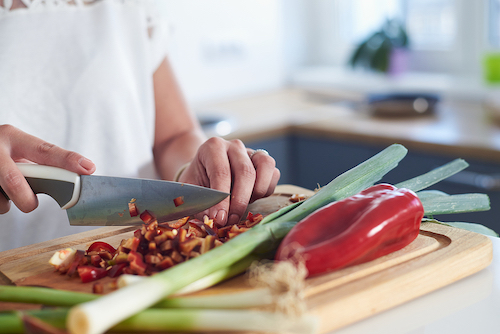 Being a confident cook isn’t just beneficial for the taste buds but also for mental health.
Being a confident cook isn’t just beneficial for the taste buds but also for mental health.
Researchers from Edith Cowan University in Australia found that those who engaged in a 7-week healthy cooking class had improved confidence in the kitchen as well as better general and mental health.
“Having the confidence to cook from scratch using fresh ingredients supports self-efficacy to overcome the barriers to healthy eating such as time constraints and abundance of convenience foods,” Dr Joanna Rees, lead author of the study, told Theravive.
“Meal creation can be a rewarding experience if it can be achieved quickly and simply at no extra time or financial cost to the creator. The positive experience of being able to create a healthy meal could, in itself, boost mental health, as well as the added benefits that the healthy food will provide for the functioning of the gut-brain axis and improve overall health too.”
During the study, 657 people took part in a seven-week healthy cooking course. During this period, researchers measured the participants’ confidence in their own cooking, their mental health, and their level of satisfaction with their cooking and eating habits.
The researchers found participants had increased confidence and better physical and mental health.
Rees says this highlights how empowering people to be confident in the kitchen can have beneficial mental health outcomes.
“This 7-week community-based cooking program was able to improve confidence and satisfaction in cooking and also the confidence to overcome some of the barriers to healthy eating. The program also improved general and mental health. Therefore this type of intervention represents an efficacious strategy to be considered when tackling the rise in population obesity and declining diet quality and mental health,” she said.
“Home-cooking allows the consumer to take control over the quality of the food they eat. Being confident to do this not only improves cooking satisfaction and enjoyment but also self-efficacy, all of which is beneficial for mental and physical health.”
The study is the latest in a growing body of evidence that highlights the importance of diet in mental health.
“Previous research at ECU had found that higher intakes of fruit and vegetables were associated with better mental health both cross-sectionally and after five years. The study also found similar positive associations between higher intakes of fruit and vegetable-derived dietary fibre and resistant starch (which are known to support a healthy and protective gut microbiome) with better mental health after five years,” Rees said.
“Higher intakes of discretionary foods (such as energy-dense, nutrient-poor processed foods like meat pies, cakes and biscuits), were associated with poorer mental health outcomes. These findings support recent research that has demonstrated the bidirectional relationship between the gut microbiome and the brain, called the gut-brain axis. Poor diet quality can have a detrimental effect on the richness and diversity of the gut microbiome that compromises the communication pathways involved in mental and physical functioning of the host.”
Rees says the research is an important reminder to policy makers that educating people about the importance of healthy cooking and healthy eating doesn’t only have physical benefits but also mental health benefits.
“Health policy makers, health promotion and nutrition professionals need to work with local government and community to co-design healthy food environments that limit fast-food outlets and advertising of unhealthy foods on government assets,” she said.
“Local parks with food kitchen gardens and advertising of fresh produce should be prioritised to increase the exposure of children and community members about the importance of healthy foods. Population mental health is extremely vulnerable in present times and policy to prevent further declines by targeting a reduction in the consumption of ultra-processed foods and continued efforts to increase fruit, vegetable and dietary fibre intakes should be a priority.”
Elizabeth Pratt is a medical journalist and producer. Her work has appeared on Healthline, The Huffington Post, Fox News, The Australian Broadcasting Corporation, The Sydney Morning Herald, News.com.au, Escape, The Cusp and Skyscanner. You can read more of her articles here. Or learn more about Elizabeth and contact her via her LinkedIn and Twitter profiles.